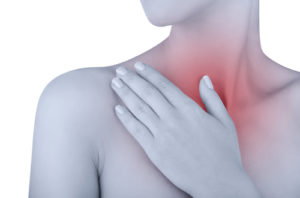Did you know that out of the 25 million Americans who suffer from a thyroid disorder, most of them are female? The thyroid is a gland that helps to control the body’s energy supply and releases a hormone that regulates metabolism, body temperature, along with many other things such as keeping your nails & hair healthy, brain sharp, and periods regular. Thyroid disorders are categorized by either hypothyroidism which is the production of too little thyroid hormone, or hyperthyroidism when you produce too much (seen sometimes after pregnancy). Both thyroid disorders produce opposing symptoms.
Hypothyroidism
- You are always tired
There are many reasons you may feel exhausted, but this is also a core issue linked to hypothyroidism (result of low thyroid hormones). Are you getting a full 7-8 hours of sleep at night and still feeling slow? You may have an underactive thyroid.
- You are feeling blue
Some suggest that hypothyroidism can impact serotonin in the brain, which can leave you feeling depressed or down.
- You’ve lost interest in sex. If you have hypothyroidism, you will have a low libido.
- Your menstrual cycle has changed, with more cramps and a longer period.
- You seem to be forgetful.
- Your skin is flaky or dry.
- You have been constipated.
- You get the chills.
- You are always tired, and can’t seem to get enough sleep.
- You have gained weight. This is the top reason why doctors will check for a thyroid disorder.
- You have high LDL cholesterol, not responding to diet, exercise or medication.
Hyperthyrodism
- You feel wired, jittery and anxious? If your thyroid is overactive it can release too much hormone causing you to not be able to relax
- You are hungry all the time.
- You have difficulty concentrating.
- You have a fluttering heartbeat. Does it feel like you have palpitations, or your heart is skipping a beat? This is a sign of too many thyroid hormones.
- You have diarrhea.
- You have an irregular menstrual cycle.
- You have difficulty sleeping.
Do you have any of these symptoms? Schedule an appointment with your physician or call us to today (949) 566-8179 or www.privatemds.com!


